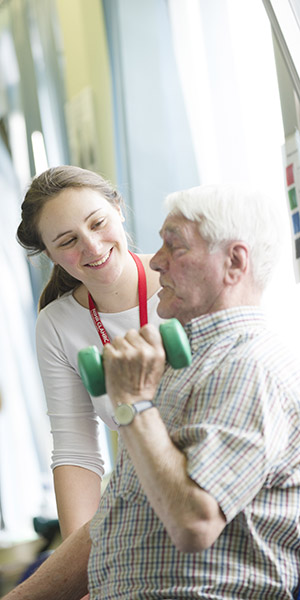 Everyday activities that most of us take for granted can prove challenging for patients with heart and lung conditions. Our expert therapists not only support people with their recovery after a procedure, but also help them manage long-term conditions, cope with symptoms and regain their confidence and independence.
Everyday activities that most of us take for granted can prove challenging for patients with heart and lung conditions. Our expert therapists not only support people with their recovery after a procedure, but also help them manage long-term conditions, cope with symptoms and regain their confidence and independence.
The Trust’s rehabilitation and therapies services are designed to provide care for the ‘whole’ patient, from exercise rehabilitation to psychological therapies and dietetics.
Our experts in recovery and therapy include physiotherapists, occupational therapists, dietitians, clinical psychologists and speech and language therapists. We also provide specialist supportive and palliative care, chaplaincy, services for older people, safeguarding (adults), complex discharge and psychiatry.
Working together as multi-professional teams, we consider all the needs of patients as they recover from treatment and start to get on with their lives.
Pulmonary rehabilitation service celebrates 10th anniversary
Harefield Hospital’s Pulmonary Rehabilitation service celebrated its 10th anniversary in 2019.
The service is one of the largest and leading rehabilitation programmes in the UK with more than 1,000 referrals per year.
Eight-week exercise and educational programmes are offered to help patients who have respiratory conditions such as COPD (chronic obstructive pulmonary disease).
The aim of pulmonary rehabilitation is to improve exercise tolerance and quality of life and as well as reduce breathlessness. The programme is run by a dedicated team of respiratory physiotherapists with classes held in a custom-built gymnasium with state-of-the-art equipment at the hospital and also at sites in the community.
Patients are given individualised exercise programmes suitable for their level of fitness. Alongside the exercises, there are educational sessions encompassing all aspects of respiratory care.
During the course of the programme, the level of exercise is increased as patients become fitter, so by the end of the programme they are less breathless and better able to cope with daily activities.
The service has an expert multidisciplinary team that includes a chest physician and a wider educational team including a psychologist, social worker, occupational therapist, speech and language therapist, dietitian, respiratory nurse specialist and pharmacist.
It also offers specialist pulmonary rehabilitation for lung transplant recipients and patients recovering from lung cancer surgery.
Dr William Man, who leads the pulmonary rehabilitation service, said: “I am really proud of the dedication and specialist skills of the Harefield pulmonary rehabilitation team. Thousands of patients have benefited from the service in the last 10 years and I’m confident it will continue to benefit many more in years to come.”
New campaign to aid quicker recovery
A new campaign encouraging patients to get up, get dressed and be more active, was embraced by patients across the Trust following its launch in summer 2019.
The campaign called – Get up, get dressed, get moving – was rolled out to all non-critical care wards.
Katharine Scott, lead for older people, who leads the initiative, said: “We want to change the current health culture in which patients expect to spend their time in bed and in pyjamas while they are in hospital to one where they get up, dressed and start moving around as soon as they are able to do so.”
Research shows that being dressed in their own clothes makes patients feel better and encourages them to maintain their independence and stay mobile, resulting in shorter hospital stays. It also means that patients have fewer falls and are less likely to develop complications such as pressure sores.
Katharine added: “We will be evaluating the results of the campaign to see if we can increase the percentage of patients getting up and dressed, while also monitoring for reduction in the length of hospital stays, falls and pressure sores.”
The initiative ties in with the global #EndPJParalysis campaign – an international movement supported by nurses, therapists and other health professionals to encourage inpatients to become more active while recovering in hospital.
